Our History
The World Family Organization – The International Union of Family Organizations was created in Paris on 22-28 June 1947, a very important day for families worldwide and future generations. Download bellow the Declaration of Family Rights written in 1994 at the occasion of the creation of the International Year of the Family.
The History of the World Family Organization
The idea to create an International Organization to deal with Family matters was born for the first time in June 1, 1946 in an International Congress for Families and Population in Brussels.
The first World Family Congress took place in Paris on 22-28 June 1947. The recently created United Nations, along with 200 delegates from 27 nations represented at this Congress, founded the International Union of Family Organizations – IUOF, having the following functions:
- Reunifying Families separated by the II World War;
- Documentation;
- Liason among all civil movements in favour of a better life for all families;
- Representation within Governments, public opinion and International Organizations, starting with United Nations

In 1997, the 50th Anniversary of the IUFO was celebrated in Foz do Iguaçú – Brazil. The General Assembly decided to delegate to the new elected Executive Board the preparation of amendments to the Constitution and the reformulation of the Executive Structures of the Organization according to the document prepared for the Celebration of the 50th Anniversary: “UIOF 50 Years – A New Depart”.
In 1998, IUFO’s General Assembly held in Vienna, Austria, approved amendments to the Constitution and renamed the institution’s name to World Family Organization – The International Union of Family Organizations.
See below the historical events and scientific achievements by WFO.
The World Family Organization and its Scientific Achievements
Organizing International Congresses, Conferences and Study Sessions have been one of the very positive activities of the World Family Organization since 1948. Every year, one International Congress or Conference takes place in different countries and are open to all Members, as well as all other organizations or personalities wishing to take part in the work undertaken, and allow the meeting of those responsible for Family and Social Policies at the Government level with experts from public and private bodies, social workers and representatives of Families themselves.
The very number of subjects dealt which emphasizes the determination of the World Family Organization to promote the study of all the major questions in which the future of the Family is involved.
The subjects treated since 1948 provide the proof:
• 1948 – Geneva: Juvenile Delinquency and Family Responsibilities.
• 1949 – Rome: Compensation for Families in the World.
• 1950 – Helsinki: Family Allowances and National Incomes.
• 1951 – Brussels: Family Policy and Family Movements.
• 1952 – Zurich: Family Allowances.
• 1952 – Oxford: Stability on the Family.
• 1953 – Lisbon: The Family and Social Techniques.
• 1954 – Stuttgart: Family Action in the Working Class and Rural Milieus.
• 1956 – The Hague: Culture and Rural Families.
• 1957 – Rome: Families Deprived of the Father.
• 1958 – Paris: Rediscovery of the Family by the Contemporary World.
• 1959 – Vienna: Offsetting Family Burdens, a point of Social Policy.
• 1960 – New York: Personal Maturity and Family Security.
• 1961 – Madrid: The work of the Mother.
• 1962 – Rabat: Families and the Future of Young People in Modern Society.
• 1963 – Rio de Janeiro: Families in the Space Era.
• 1964 – Munich: Families in Modern Society.
• 1965 – Rome: New Families.
• 1966 – New Delhi: Changing Families in Society.
• 1967 – Quebec: Young Families in Society.
• 1968 – Vienna: Young Families: The Couple’s Life and Family Life.
• 1969 – Paris: The Vital Need for Family Policy.
• 1970 – London: Parent – Teacher Relation.
• 1970 – Rwanda: Inter-African Symposium on the African Family Facing Development.
• 1970 – Tunis: School, Family and Development.
• 1971 – Madrid: Economic Problems of the Family.
• 1972 – Ottawa: The Role of Family Movements.
• 1973 – Liege: The Objectives of Family Participation in a Changing Society
• 1973 – Rabat: Regional Conference of the Maghrebian: Families and Responsibilities.
• 1974 – Geneva: Problems of the Family of Migrant Workers.
• 1975 – Paris: Condition of Women in the Family and Society.
• 1976 – Helsinki: The Role of Public Authorities in Development of Family Policies.
• 1976 – Kigali: The Participation of the African Family and Urban Development.
• 1977 – New Delhi: The Family as a Unit of Welfare in National Planning.
• 1977 – Tunis: Solidarity amongst the World’s Family.
• 1978 – New Delhi: Asian Region Meeting of the Convening Body.
• 1979 – Paris: The Family’s Responsibilities in the Upbringing of the Child.
• 1979 – Colombo: Family and the Natural Environment for Child Development.
• 1980 – Lisbon: Unemployment Amongst Young People and Children at Work.
• 1980 – Dakar: Seminar on Child Nutrition.
• 1981 – Montreal: The Role of the Family in the Child’s Education.
• 1981 – Bucarest: Law, Family and Development.
• 1982 – Vienna: The Family in Europe towards the Year 2000.
• 1982 – Manila: Strengthening Family Life: Implication of Values and Traditions.
• 1983 – Madrid: First Ibero-American Meeting.
• 1983 – Naples: Family and Communication.
• 1983 – New Delhi: Afro-Asian Conference: the Role of Play and Child Development.
• 1984 – Bogota: Second Ibero-American Meeting: National Policies and Programs for Families.
• 1985 – New Delhi: Family in the Face of Urbanization.
• 1986 – Bonn: Family, Freedom and Peace.
• 1987 – Paris: Families and Culture.
• 1987 – Strasbourg: Families and Medias.
• 1988 – Lisbon: Families and Health Promotion.
• 1989 – Casablanca: African Family and Environment: the Role of the Women.
• 1989 – Athenes: The Migrant Family.
• 1990 – Benghazi: Arab-African Conference: Public programs for the protection of the Family.
• 1990 – Moscow: Global Family Policy.
• 1991 – Nicosia: The Social Rights of Families.
• 1992 – Warsovie: The Legal Rights of Families.
• 1992 – Curitiba: The Economic Rights of Families.
• 1993 – Luanda: Family, Education and Development.
• 1993 – Paris: Educational Responsibilities of Families.
• 1993 – Cairo: The Cultural Rights of Families.
• 1994 – Paris: International Year of Family: Declaration of Family Rights.
• 1995 – Macao: The Family in the third Millennium: For a Culture of Peace and Development.
• 1996 – Montreal: Family, Youth and Communication.
• 1997 – San Francisco: Family Legislation and the Rights of Children.
• 1997 – Foz do Iguaçu: WFO’s 50th Anniversary: Family and Social development.
• 1998 – Austria: World Family Organization New Depart: For a Global Family Policy.
• 1999 – Durban: Reconciling Violent Relationships in the Family.
• 1999 – Abu-Dhabi: Families and the Challenges in a Globalized World.
• 2000 – Geneva: Families – The Next Step for Social Development.
• 2000 – New York: Promoting Dialogue and Peace among Civilization.
• 2001 – Lisbon: The Family as Defenders and Guardians of the Rights of Children.
• 2002 – Paris: The Families Voices in the Dialogue among Civilizations.
• 2003 – Djerba: Platform for a Global Action in Favor of the Family.
• 2004 – Vienna: European Regional Conference: Platform for a Global Action in Favor of the Family.
• 2004 – Hammamet: Arab Regional Conference “The Access of Women and the Family to the New Information and Communication Technologies”.
• 2004 – Cotonu: African Regional Conference: “Plan of Action on the Family in Africa”.
• 2004 – Curitiba: Latin America Regional Conference: “For a Global Family Policy”.
• 2004 – 2014 – The cycle of the World Family Summit



